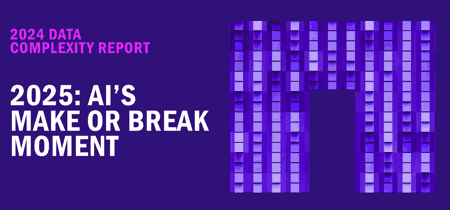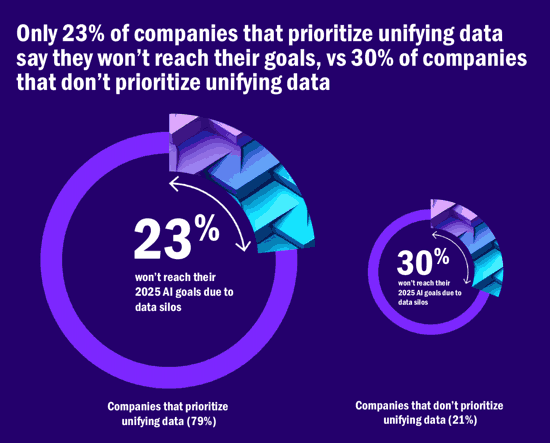Data and AI, Major Challenge for Coming Year
As per second annual NetApp Data Complexity Report conducted by Wakefield Research
This is a Press Release edited by StorageNewsletter.com on December 26, 2024 at 2:02 pmNetApp, Inc. released its 2nd annual Data Complexity Report, which examines how global organizations are navigating the increasing complexity of managing their data for AI.
This year’s report provides a global view into how AI will impact organizations in 2025 and beyond, offering insights to help businesses leverage AI’s potential while navigating the complexities and risks that accompany this transformative technology.
“2025 is shaping up to be a defining year for AI, as organizations transition from experimentation to scaling their AI capabilities,” said Gabie Boko, CMO, NetApp. “This year’s Data Complexity Report shows that businesses are making significant investments to drive innovation and efficiency, but these efforts will succeed only if global tech executives can address the mounting challenges of data complexity, security, and sustainability. Intelligent data infrastructure, with unified storage at its core, will be key to unlocking AI’s potential.“
AI Investment: Will AI Break the Bank?
Two-thirds of companies worldwide report that their data is either fully or mostly optimized for AI-meaning their data is accessible, accurate, and well-documented for AI-use cases. However, despite this progress, 2025 will still demand investment in AI and data management. In fact, 40% of global technology executives believe that unprecedented investment in AI and data management will be required for their companies in 2025. While companies have made strides in optimizing data for AI, achieving future breakthroughs will demand even greater commitment and resources.
Data Silos: Will Your Data Impede AI Success?
Data unification is emerging as a critical driver of AI success, with 79% of global tech executives recognizing the importance of unifying data to achieve optimal AI outcomes. Companies that have unified storage have been able to remove data silos by connecting data regardless of type or location across hybrid multicloud environments so it is always accessible. Companies that prioritize unifying data are more likely to reach their AI goals in 2025, with only 23% of companies that prioritize unifying data saying they won’t reach their goals, vs. 30% of companies that don’t prioritize unifying data. Investing in data management and infrastructure has become the top priority for organizations, with executives emphasizing it twice as much as other AI-related initiatives – a trend set to grow. Looking to the future, organizations that embrace data unification will be better positioned to fully harness the transformative power of AI, ensuring they stay ahead in an increasingly competitive landscape.
Data Security: Will Cyber Threats Scale Along with AI?
Global tech executives are bracing for a significant rise in security threats alongside AI adoption, with 41% predicting a sharp increase in 2025. Data privacy and security concerns have remained top challenges globally Y/Y, with AI-leading countries like India, Japan and the US (whom are farther ahead in their AI journey) nearly twice as likely to report an increase in the number of security issues compared to AI-lagging countries like Germany, France, and Spain.
The rise of AI has increased the attack surface of many organizations, creating new challenges such as protecting AI-models themselves, defending data sets that are more exposed to attacks, and ensuring data is available and secure for use in AI applications. AI-driven security challenges are weighing heavily on the minds of global tech leaders, with 59% identifying these threats as a global stressor.
This heightened focus reflects the growing complexity of cyber risks. Executives at the board and C-suite levels continue to prioritize cybersecurity and ransomware protection, with 38% ranking it as their top priority. However, there’s a silver lining: the strategic measures organizations have implemented appear to be paying off. The focus on cybersecurity as a top priority has decreased by 17% since 2023 – a promising sign that progress is being made in combating these ever-evolving threats.
Data Sustainability: Is AI Putting the Planet at Risk?
As AI adoption accelerates, 34% of global tech executives anticipate major shifts in corporate sustainability processes, and 33% expect new government energy policies and investments. AI-driven data growth and the infrastructure needed to turn data into business value uses a lot of energy, which runs counter to sustainability goals, with AI-leading countries experiencing a greater impact than AI-lagging countries.
Carbon footprint reduction remains very important, especially in regions with high AI adoption, though its focus has declined year over year, from 84% of companies in 2023 to 72% in 2024. The challenge moving forward will be managing the environmental costs of AI while maximizing its potential for innovation.
This year’s Data Complexity Report highlights a pivotal shift: businesses that invest in intelligent data infrastructure, prioritize security, and factor in sustainability are not only future-proofing their operations but also gaining a significant competitive advantage in the AI-driven landscape.
“AI’s transformative potential hinges on secure, scalable, and sustainable data strategies,” said Krish Vitaldevara, SVP and GM, NetApp. “The organizations leading in advanced analytics and AI are those that have unified and well-cataloged data, robust security and compliance for sensitive information, and a clear understanding of how data evolves. By tackling these challenges, they can drive innovation while ensuring resilience, responsibility, and timely insights in the new AI era.“
Methodology
NetApp partnered with Wakefield Research to conduct a quantitative research study during November 2024, among 1,300+ IT executives in 9 markets: US, EMEA (UK, France, Germany, Spain) and APAC (Australia/New Zealand, Singapore, India and Japan).















 Subscribe to our free daily newsletter
Subscribe to our free daily newsletter

